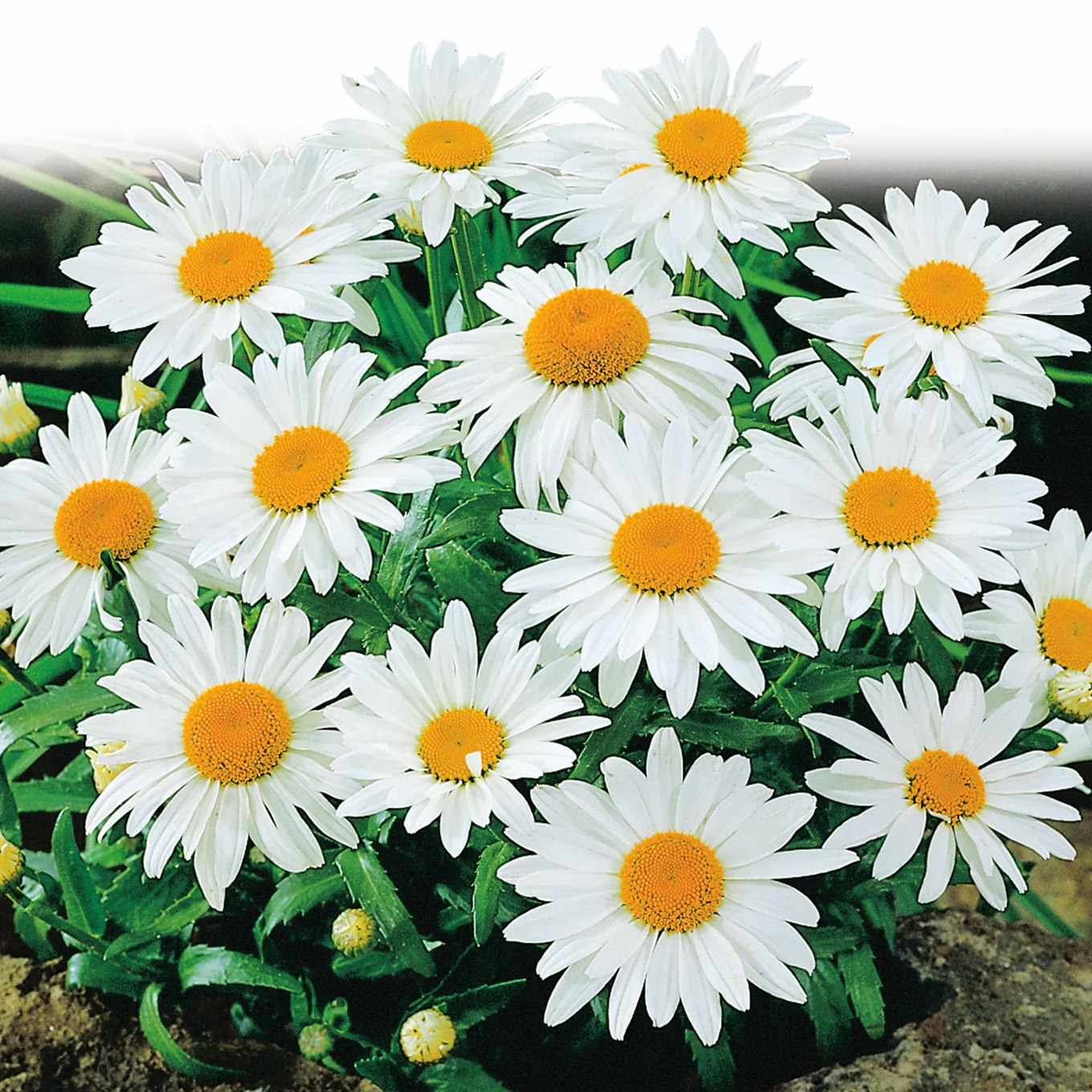
Shasta Daisy
Botanical Name
:
Leucanthemum × superbum
Plant Type
:
Flowering herbaceous perennial
Seasons
:
Plant in early spring or summer; Blooms from early summer to early fall
Sun Level
:
Full sun; at least 6 hours of full sun per day
Ideal Soil Temperature for Planting
:
65–75°F (18–24°C)
Soil Type
:
Loamy, moist but well-drained
Hardiness Zones
:
5–9 (USDA)
Germination
:
Seeds germinate in 10–20 days
P.H. Level
:
Neutral (6.0–8.0)
Water/Irrigation
:
About an inch of water each week; drought-tolerant and can survive short periods without water
Fertilization
:
Use a balanced fertilizer with an NPK ratio of about 3-4-5 in spring and summer
Habit
:
Clumping, upright growth habit, spreading slowly via rhizomes
Propagation
:
Division and seeds
Final Plant Height
:
9 in. – 3 ft
Spread
:
1–2 ft
Flowers
:
Gold, yellow, white
Attracts
:
Bees and butterflies
Uses
:
Cut flowers, border planting, container gardening
Companions
:
Algerian iris, lavender, marigolds, campanula, liatris, Russian sage, and roses
Pruning
:
Deadhead spent blooms regularly throughout the growing season
Toxicity
:
Mildly toxic to humans and pets
Pests
:
Aphids, thrips, spider mites, fungus gnats, and fruit flies
Diseases
:
Chlorosis, necrosis, and leaf rot
Fun Fact
:
The common name “Shasta Daisy” is derived from Mount Shasta, as the plant’s white petals resemble snow.
Botanical Name
:
Leucanthemum × superbum
Plant Type
:
Flowering herbaceous perennial
Seasons
:
Plant in early spring or summer; Blooms from early summer to early fall
Sun Level
:
Full sun; at least 6 hours of full sun per day
Ideal Soil Temperature for Planting
:
65–75°F (18–24°C)
Soil Type
:
Loamy, moist but well-drained
Hardiness Zones
:
5–9 (USDA)
Germination
:
Seeds germinate in 10–20 days
P.H. Level
:
Neutral (6.0–8.0)
Water/Irrigation
:
About an inch of water each week; drought-tolerant and can survive short periods without water
Fertilization
:
Use a balanced fertilizer with an NPK ratio of about 3-4-5 in spring and summer
Habit
:
Clumping, upright growth habit, spreading slowly via rhizomes
Propagation
:
Division and seeds
Final Plant Height
:
9 in. – 3 ft
Spread
:
1–2 ft
Flowers
:
Gold, yellow, white
Attracts
:
Bees and butterflies
Uses
:
Cut flowers, border planting, container gardening
Companions
:
Algerian iris, lavender, marigolds, campanula, liatris, Russian sage, and roses
Pruning
:
Deadhead spent blooms regularly throughout the growing season
Toxicity
:
Mildly toxic to humans and pets
Pests
:
Aphids, thrips, spider mites, fungus gnats, and fruit flies
Diseases
:
Chlorosis, necrosis, and leaf rot
Fun Fact
:
The common name “Shasta Daisy” is derived from Mount Shasta, as the plant’s white petals resemble snow.
Written by Nondiah Khalayi – https://www.linkedin.com/in/nondiah-khalayi/

